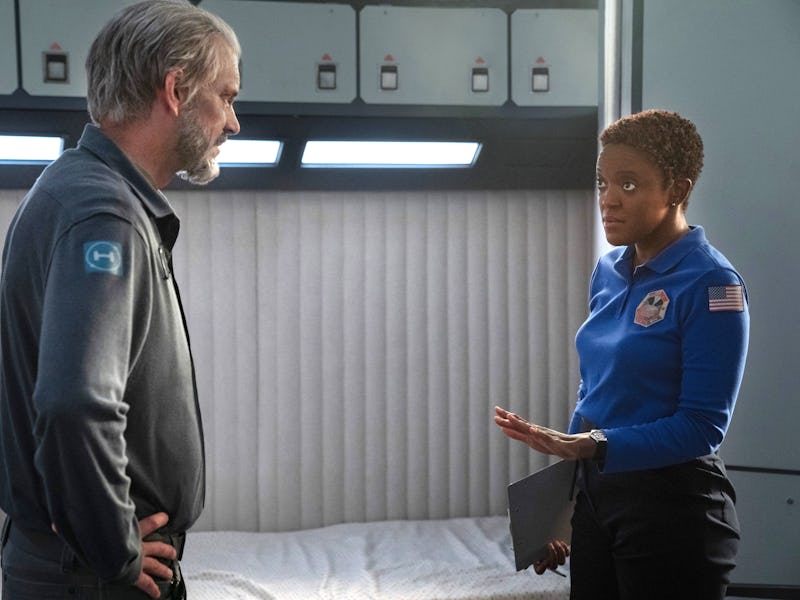For All Mankind's Wild Star Trek Easter Egg Changes Both Shows
The showrunners of Apple’s hit series explain how Trek fits into its universe.

In a pivotal scene in For All Mankind Season 4, Episode 4, “House Divided,” old friends Ed Baldwin (Joel Kinnaman) and Danielle Poole (Kys Marshall) clash over what to do about cosmonaut Svetlana Zakharova (Masha Mashkova) after she gets in a Martian dust-up with a Helios worker. As Ed and Dani debate, we clearly see a book in Dani’s office: Beyond Uhura by Nichelle Nichols. But how can this memoir by a sci-fi legend from our universe be in theirs?
Inverse chatted with For All Mankind’s showrunners, Ben Nedivi and Matt Wolpert, to get a sense of how the very Star Trek-esque moral quandaries of For All Mankind influence both the show itself, and the pop culture within this alternate timeline.
For anyone who watched Captain Picard or Captain Sisko wrestle with the ethics of whether their home planet should extradite a crewmember, the themes of “House Divided” will feel familiar. The show posits that even if governments on Earth did come together in a Marian alliance, the laws of certain countries would sometimes conflict with the unity created by space travel. To make matters more complicated, Danielle Poole has to make a hard decision that will hurt her oldest colleague, Ed Baldwin. We know Ed is in love with Svetlana, and we know Svetlana is probably in the right. But Dani has to make the hard call, Star Trek style.
Nichelle Nichols underwent astronaut training in 1977 as part of a NASA recruitment drive.
Funnily enough, one of Danielle Poole’s heroes in the show is Star Trek: The Original Series’ Lt. Uhura, and by extension Nichelle Nichols, the actress who played her. The presence of Beyond Uhura in her office during these scenes is more than just an Easter egg.
“As Danielle has referenced a few times in the show, she’s a massive Star Trek fan,” Matt Wolpert explains. “Now, of course, that book is a fundamentally different book on a few levels.”
Beyond Uhura would be different in the For All Mankind timeline because, in that timeline, women and people of color enter the space program much earlier than in our own universe. Starting in Season 1 with “Nixon’s Women,” female astronauts become integral to the storyline. Danielle Poole, in this timeline, became the first Black woman in space in the early 1970s.
In our timeline, the first Black astronaut was Mae Jemison, who flew on the space shuttle Endeavour in 1992. Also a massive Star Trek fan, Jemison was inspired by Nichelle Nichols, but not just because of the TV series. In 1977, Nichelle Nichols led a recruitment drive for NASA to attract women and people of color. Nichols is credited with helping to recruit the first Black astronauts, Guion Bluford and Ronald McNair, as well as the first woman, Sally Ride.
Again, the For All Mankind timeline is different. Sally Ride (Ellen Wroe) was a pivotal character in Season 2, and she flew for NASA earlier than she did in our timeline. This means Nichelle Nichols’ efforts to create a more diverse space program may not have been the same, or at least didn’t occur at the same time. But that doesn’t mean Nichols isn’t a massively influential figure in this timeline too.
“I think that even though women and people of color entered the space program differently, [Nichols] still had an impact on how people saw themselves as being part of the space program,” Wolpert says. “It might change in the details, but I think the thrust probably of the book and of her impact on the culture is similar to that of our own timeline.”
Uhura’s memoir may be different in For All Mankind, but the gist of it would be similar.
Series co-creator Ronald D. Moore has previously said he does “spend some time thinking about” alternate Star Trek releases in this timeline. This makes sense, given that Moore wrote for The Next Generation and Deep Space Nine, and co-wrote two feature films, Generations and First Contact. He certainly knows a thing or two about how Star Trek impacted both pop culture and real life. “In my version of history, Paramount does make the Phase II show in the mid-seventies,” Moore told Inverse in 2021. “And then they transitioned into Wrath of Khan and not Star Trek: The Motion Picture.”
So, although Nichelle Nichols’ famous memoir may have different content in For All Mankind than in our universe, Nichols is a hero no matter what timeline you’re in.
For All Mankind airs on Apple TV+.
Subscribe for free to Inverse’s award-winning daily newsletter!